She Went All the Way Read online
Page 15
Still, he didn’t miss it when Lou finished her sentence: “—sorry!”
He could hardly see now, his eyes were watering so badly from the cold. He knew he should have grabbed the snow goggles he’d seen hanging around Ski Mask’s neck. But he hadn’t wanted to touch Ski Mask, let alone any of his gear.
Still, he could make out the shapes of the trees as they barreled towards them. And there was Lou, who was sheltered from the wind by his body, shouting instructions at him at the top of her lungs: “Left!” Then, “Right!” Then, “Townsend, what are you doing? Left, left!”
He couldn’t tell anymore if there were still bullets whizzing past them. On the whole, he thought not. It would be hard to operate a Ski-Doo at the velocity at which they were traveling, and fire a gun at the same time.
They were still in pursuit, however. He could see them out of the corners of his eyes, yellow and red blurs. The sight of them caused his blood to boil. Just what had he done to deserve this? He hadn’t lied to Lou when he’d told her he didn’t do drugs or gamble. Hell, his off-screen life was downright boring. He gave to the Make-a-Wish Foundation and Fresh Air Fund. He’d donated enough money to St. Jude’s Children’s Hospital that there was a wing named after him. He even rescued abused or abandoned horses and let them live out their days in equine luxury on his ranch.
So who the hell wanted him dead?
With his peripheral vision, he saw that two of the snowmobiles behind him—there were four in all—were gaining. Soon they’d be within a few feet of the Ski-Doo. Easy firing distance.
Ahead of him was a wide open area, strangely treeless. He didn’t see why. Not right away, anyway. All he thought was that it was possible that, by pushing the snowmobile to the limit, then jerking it into a sudden turn and making for the woods to his left, he could lose his pursuers.
He would probably, however, also lose Lou, who was currently shouting something hoarsely in his ear. He had no idea what. Was she aware of the fact that, if the gunmen behind them did get close enough to fire, she’d take a bullet first? Her body would, in fact, shield him, for a while, from the rain of bullets.
He didn’t think she was aware of it. All she was concentrating on was his steering, which, like most backseat drivers, she apparently found execrable.
He couldn’t allow her to die. Lou Calabrese had, for years, been far from one of his favorite people.
But life without her would definitely lose a certain flavor. There weren’t many women who categorically despised him. Certainly none, except for Lou, to whom he was attracted. Why he should be so drawn to her when she’d made her own, very different feelings for him so clear, he could not imagine. Maybe because she seemed to dislike him so much?
In any case, he couldn’t let her die, either by flying off the back of the Ski-Doo because of an evasive maneuver he pulled, or because of any bullets that might be fired in his direction. It was, he saw, a no-win situation. Either she was going to die, or they both were.
And then he saw it. A gorge. That was why there were no trees ahead of him. Because they were careening towards a six-foot rip in the earth, at the bottom of which was probably a stream, picturesque in summertime, frozen solid now. There was no bridge, not this far in the wilderness. It was, without question, the end of the road.
He could turn, of course. Turn right into firing range. Or he could keep going straight. Either way, he realized now, was certain death.
He accelerated, heading straight for the gorge.
“Townsend!” Lou shrieked. She’d seen it now, what they were headed for. And she didn’t like it very much.
“What are you doing? Are you insane? Turn! Turn!”
Jack kept his fingers gripped on the accelerator, and his gaze on the gorge.
“You ever see Smokey and the Bandit?” he called to her, over his shoulder.
“I thought,” she screamed back, “you don’t like movies—”
The word movies ended on a shriek so loud, he imagined it could have been heard all the way down in Anchorage. It certainly echoed through his head, the whole time they were sailing, suddenly weightless, through the air, over the snowbank that had formed to one side of the ravine, and across the chasm. He had a startling glimpse, as he looked down, of cascading rapids far, far below. The current would have to have been pretty strong not to have frozen over in this weather. He had time to wonder if, when they plummeted down into the water, they’d be dashed across the rocks, or simply be plucked up by that current and drowned….
And then the front runners of the Ski-Doo were connecting with the bank on the opposite side of the gorge, while the back of it, its rotor still spinning, began to sink….
“Jump!” Jack shouted, grasping Lou’s arms, which were still wrapped around him, and hurling his body with all his might to the left.
She fell with him, and the two of them landed in the snow on the far side of the ravine, while the Ski-Doo, behind them, tottered, then dropped a hundred feet to the rapids below.
Across the gorge, their pursuers were not so lucky. Instead of accelerating, as Jack had, they threw on the brakes—one of them, on a red Arctic Cat, not soon enough. He went plunging headlong, snowmobile and all, into the chasm.
Jack didn’t hang around to see what happened to the others. Scrambling to his feet, and pulling Lou up along with him, he yelled, “Run!” Then, keeping a grip on her arm, began tearing towards the trees.
He expected to feel the sting of bullets in his back at any time. He ran all out, the frigid arctic air piercing his lungs. Beside him, Lou kept up, the color in her cheeks high, her breath coming out in puffs of white. Jack tried to remember to zigzag—a target that wasn’t moving in a straight line was harder to hit, one of the cops he’d had a ride along with all those years ago, when he’d been researching the character of Pete Logan, had informed him. He pulled Lou along with him. She came, unprotesting, the laptop around her shoulders banging heavily against her hip.
He didn’t know how long they’d run before he realized no one was firing at them. He started slowing down, realizing that they were in woods deep enough that no snowmobile could follow…even if their hunters could figure out a way to cross that gorge.
Lou, however, her pupils so dilated that her eyes looked completely black, kept tugging on him.
“Come on,” she said. “Jack, come on. They’re still back there. Come on, Jack.”
“No.” Jack stopped and, leaning against a tree and panting heavily, looked back. “No, they’re not, Lou. Look. They’re still across the gorge. We lost them. For now.”
Lou, her face white as the snow around them, except for the twin spots of red on her smooth cheeks, looked. Her breath, like his own, was coming out in ragged gasps.
“Oh my God,” was all she could say. “Oh my God, Jack.”
Her eyes, he noticed, were so large that they seemed to consume the rest of her face. Her breath wasn’t coming out in gasps either, he now realized. She was sobbing. Tearlessly, but still sobbing. He’d never seen anyone look so terrified.
“It’s okay,” he said, reaching out to wrap an arm around her neck, and dragging her towards him. “Hey. It’s okay.”
For a minute, it was like she was someone else. The cocky, contemptuous Lou Calabrese he was so used to disappeared, replaced by this stranger with dewy eyes and trembling lips. Lou reached up to cling to his jacket, burying her face in his chest, suddenly as soft and vulnerable as a kitten. He felt her warm breath against his neck, felt her breasts, firm and round and vital, against his chest. Amazingly, a twinge of desire shot through him.
It was incredible. He could be stranded in the arctic, hundreds of miles from nowhere, with no clue as to whether or not he was going to survive the next hour, let alone the rest of the day, but his body still reacted to the touch of a pretty woman…even a woman like Lou Calabrese, who had tried, for so long, to make his life as unpleasant as she could. Especially a woman like Lou Calabrese, who could be prickly as a cactus when she wan
ted to, but who was also, he was now discovering, capable of being as tender as a lamb….
It was just as he was wondering if he ought to make a move—it wouldn’t really be taking advantage of her momentary weakness, he thought, to tilt her chin up and kiss those lips that for once were still, and so beckoningly red and moistly parted—that Lou suddenly tensed, stepped out of his embrace, and hauled back and slugged him, hard, in the upper arm.
“Ow!” he cried, not so much from the pain the blow had caused—which was not inconsiderable—but because it had caught him so off guard. “What is your problem?”
“What is my problem?” Lou cried hoarsely. Her pupils, he saw, had retracted to their normal size. She was no longer scared. Quite the opposite. She was mad as hell. “What is my problem? What is your problem? Who the hell did you think you were back there, anyway, Evel Knievel?”
Jack rubbed his arm where she’d punched it, indignant and more than a little ashamed that he had felt even a little attraction for her.
“I got us out of there, didn’t I?” he demanded. “You might be surprised to hear this, but those were real bullets they were firing at us, not blanks, you know.”
“Firing at us?” she echoed. “Firing at you, you mean. I’m not the one who—”
“Who what?” he interrupted, hotly.
“Who did whatever you did to get somebody mad enough to want to kill you,” she finished.
Jack closed his eyes, praying for strength.
“For the last time,” he said, as slowly and evenly as he could, “I didn’t do anything to get anybody mad enough to kill me.”
“Oh, yeah? Then who is that back there?” Lou asked. “The Myra, Alaska Gun Club? What is this, a Pauly Shore flick?”
Jack took a deep breath. “Look,” he said. “I told you. I don’t know why these guys are after me. All I can do is suggest that we get the hell out of here before they figure out a way to get across that gorge and come after us. Does that sound all right to you?”
She glared at him. “And just where,” she asked acidly, “do you suggest we go? In case you haven’t noticed, we’re lost.”
He looked around. They were standing in a wooded area, noiseless except for the sound of the wind moving between the dry, brittle branches overhead. He could see nothing in all four directions but snow, trees, and rock.
It was easy enough to choose a direction. He pointed downhill and said, “That way.”
Lou looked unimpressed.
“That’s the direction they want us to go,” she said. “They were practically herding us that way.”
“Precisely why we should keep heading that way,” he said. “They’ll be expecting us to go up, back towards Myra and the crash site. With any luck, that’s where they’re heading, looking for us. Only we’ll outsmart ’em. We’ll head down, back towards Anchorage.”
She didn’t look pleased.
“I don’t know, Townsend,” she said, skeptically.
He gave her his most charming smile, the one that, the first time he’d used it on “STAT,” had generated more fan mail than any other single episode.
“Trust me,” he said.
She looked at him like he was out of his mind.
But when he started down the mountainside, trying to ignore the snow that crept up the legs of his jeans with each step, then trickled down into his boots, she followed him.
It wasn’t much, he knew. But it was a start.
14
Flowers covered every flat surface of the hotel suite. Frank hadn’t seen so many flowers—lilies, white roses, bunches of flowers he didn’t even recognize—since Helen’s memorial service, ten years earlier. The concierge—that was what the guy who’d met them in the lobby and brought them here, to Tim Lord’s suite, had said his title was—said that so many floral arrangements were pouring in that they’d been forced to start putting them in the hotel conference and banquet rooms. The entire world, he’d said, was in mourning for Jack Townsend.
And Ms. Calabrese, too, of course, he’d added with a quick glance at Frank. Frank hadn’t minded, though. Lou had explained to him long ago that on the Hollywood food chain, movie stars like Jack Townsend—and now, thanks to Hindenburg, that wimp Barry Kimmel—were filet mignon, while screenwriters, like Lou, were considered potatoes. Not even fries, either. Baked potatoes. Or sometimes even Rice-A-Roni.
The flowers in the hotel suite had a funereal look about them. Or maybe it was just because it was so quiet in the elegant white room. Tim Lord supposedly had kids—a half-dozen of them, from various different marriages. But none of them seemed to be around now. The suite was as silent as a mortuary. The floral arrangements didn’t help. One was even shaped like a wreath. Across the wreath was a white silk banner. On the banner, in gold letters, were the words, “With Our Deepest Sympathy.”
Eleanor Townsend, who, instead of going to sit down on the white couch, as the man who’d met them in the hotel lobby had suggested, was looking at all the cards that had come with the flowers. Slender and elegant in her dark suit—now covered in pale gold hair, courtesy of Alessandro, who sat alertly in her arms—she bent to examine the card belonging to the wreath.
“From the movie studio,” she said to him with some disgust. “You would think they’d wait until we actually knew for sure they were gone before extending their deepest sympathies.”
Frank looked into the cup of coffee that sat, steaming, on the glass-topped table in front of him. He hadn’t touched it yet, but it smelled like good coffee.
“Tough call,” he said. “What else were they gonna put on it? Good Luck?”
Eleanor shook her head. “They oughtn’t to have sent anything at all if they couldn’t send something with an uplifting message.”
Frank, as he had so often in the past twelve hours, found himself agreeing with Eleanor Townsend. It was amazing how frequently this seemed to be happening. It was ridiculous, because of course the two of them had absolutely nothing in common.
Look at that dog of hers, for instance. Frank had never been able to stand little yapping dogs. The Calabrese family had always had big dogs, German shepherds and labs. Frank had never had any patience for the more exotic breeds, like Yorkies and shih-tzus.
But even he had to admit there was something appealing about Alessandro. There was intelligence in those black beady eyes, and a sort of foxlike cunning in that furry little face.
And Alessandro wasn’t the only thing Frank liked about Eleanor Townsend. No, that lady had a lot more going for her than just a smart and friendly dog.
Then the door to the hotel suite burst open, and Tim Lord—Frank recognized him from the Oscars. Lou had taken her good old dad to the ceremony. He’d gotten to meet Paul Newman. Helen would have loved it—came in, followed by another, much taller fellow in a suit and tie, and carrying a briefcase.
“Frank!” Tim Lord cried when he saw him, his eyes looking unnaturally bright. Unshed tears? Or too much blow? It was impossible to tell with these movie business types. “And Mrs. Townsend, what a pleasure to meet you at last. How I wish it could be under better circumstances—”
Tim Lord darted forward and grasped Eleanor’s hand in his. The guy was, Frank noted, only an inch or so taller than she was, and Eleanor Townsend was not a large woman.
“I’m so sorry I wasn’t there to meet you in the lobby,” Lord was saying. “But the press…well, I’m sure you saw them. They’re like vultures, they really are. Disgusting creatures. I’ve been trying to give them as wide a berth as possible since…well, since the tragedy.”
Frank Calabrese didn’t know much about Hollywood, it was true, beyond what his daughter had told him. And she, he was pretty sure, painted a prettier picture of it than she should have, so as not to worry dear old dad.
But Frank hadn’t spent forty years on the force without learning a thing or two. And one thing he’d learned was to detect bullshit.
And when Tim Lord approached them, Frank Calabrese’s bullshit detector swung in
to full alert.
“Not quite a tragedy yet, Mr. Lord, ”Eleanor said in that voice of hers, that voice that reminded Frank of those old movie actresses Helen had liked, that Kate Hepburn, and the other one, the one that had married a prince. “After all, no bodies have been recovered, have they?”
Tim Lord didn’t say anything. Instead, he just looked troubled. The taller man in the suit, however, set his briefcase down on the coffee table and said, “No, they haven’t. And Mr. Lord and I are praying, like the rest of the world, that both Mr. Townsend and Ms. Calabrese are alive and well. In the meantime, however, there are a few things we need to discuss—”
Up went the lid to the briefcase. Frank, gazing in disbelief at the guy in the suit, found himself curling a lip. A lawyer. Tim Lord had brought a lawyer along with him. Unbelievable. Their kids were out there somewhere, and all the studio could worry about was covering its ass….
Then the door to the hotel suite swung open again. This time there was some sort of outburst from the other side, as if there’d been someone standing guard by the door—someone who did not want the person who was entering to do so.
But since the person striding towards them was a county sheriff in full uniform, Frank had a pretty good idea whoever it was trying to keep people out hadn’t stood much of a chance.
“Um, excuse me,” the lawyer said, looking alarmed. “May I help you?”
The sheriff was a tall guy, going gray beneath his furlined hat. He was followed by a much younger deputy, who had what looked like a painful case of windburn all over his face. The sheriff’s gray-eyed gaze went from Tim Lord to the lawyer, then to Frank and Eleanor Townsend. It stayed on Eleanor Townsend. And a hand went up to hastily remove the fur-lined hat.
“Mrs. Townsend, ma’am?” the sheriff asked politely. Behind him, his deputy also removed his hat.
Eleanor, looking alarmed, seemed to squeeze Alessandro too tightly, if the sound that came out of the little dog was any indication.

 Bridal Boot Camp
Bridal Boot Camp Party Princess
Party Princess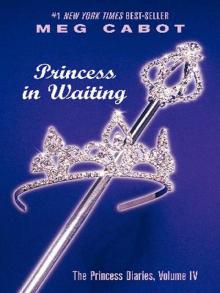 Princess in Waiting
Princess in Waiting Being Nikki
Being Nikki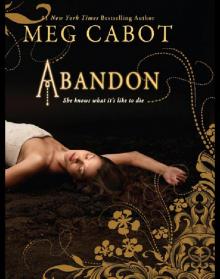 Abandon
Abandon Princess on the Brink
Princess on the Brink Darkest Hour
Darkest Hour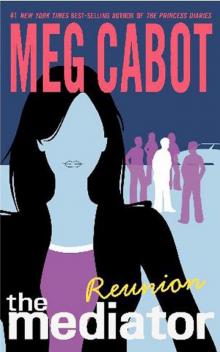 Reunion
Reunion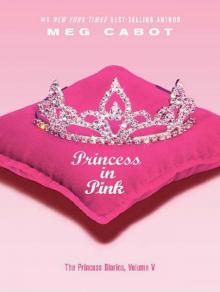 Princess in Pink
Princess in Pink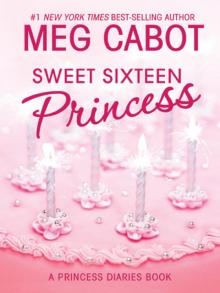 Sweet Sixteen Princess
Sweet Sixteen Princess The Princess Diaries
The Princess Diaries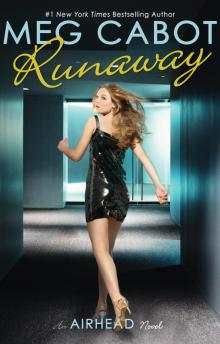 Airhead
Airhead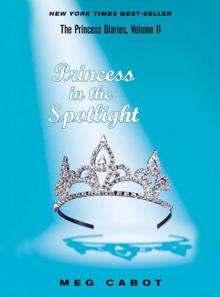 Princess in the Spotlight
Princess in the Spotlight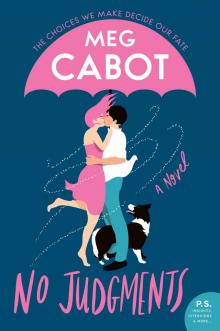 No Judgments
No Judgments All-American Girl
All-American Girl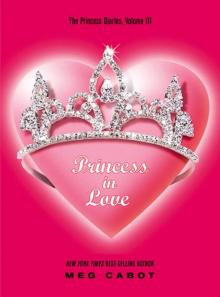 Princess in Love
Princess in Love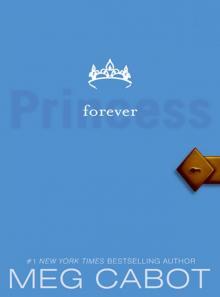 Forever Princess
Forever Princess Haunted
Haunted Shadowland
Shadowland Twilight
Twilight Princess Mia
Princess Mia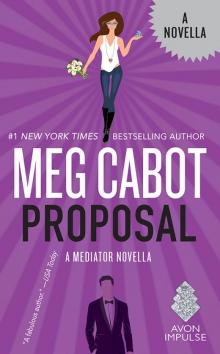 Proposal
Proposal Remembrance
Remembrance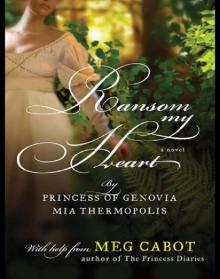 Ransom My Heart
Ransom My Heart Underworld
Underworld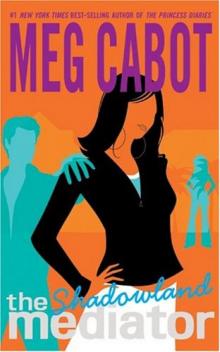 Shadowland tm-1
Shadowland tm-1 Size 14 Is Not Fat Either
Size 14 Is Not Fat Either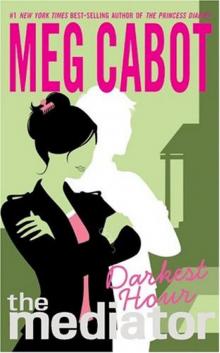 Darkest Hour tm-4
Darkest Hour tm-4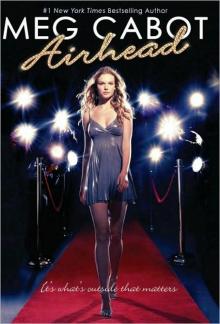 Airhead a-1
Airhead a-1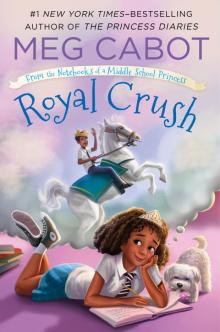 Royal Crush
Royal Crush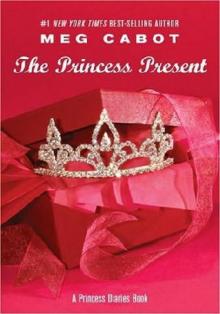 The Princess Present (princess diaries)
The Princess Present (princess diaries)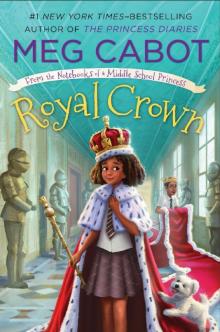 Royal Crown
Royal Crown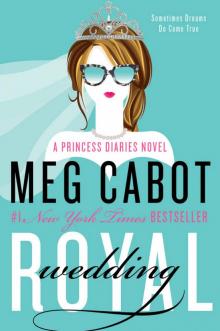 Royal Wedding: A Princess Diaries Novel (The Princess Diaries Book 11)
Royal Wedding: A Princess Diaries Novel (The Princess Diaries Book 11)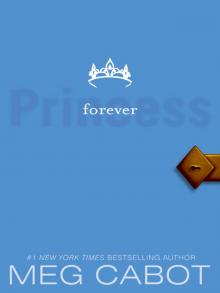 Princess Diaries, Vol. X: Forever Princess
Princess Diaries, Vol. X: Forever Princess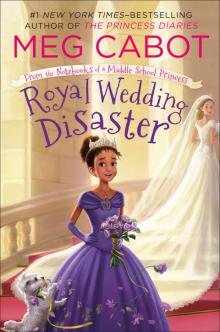 Royal Wedding Disaster
Royal Wedding Disaster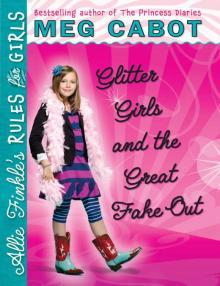 Allie Finkle's Rules for Girls: Glitter Girls and the Great Fake Out
Allie Finkle's Rules for Girls: Glitter Girls and the Great Fake Out Size 12 Is Not Fat hwm-1
Size 12 Is Not Fat hwm-1 Princess on the Brink pd-8
Princess on the Brink pd-8 The New Girl
The New Girl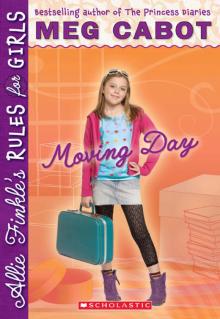 Allie Finkle's Rules for Girls: Moving Day
Allie Finkle's Rules for Girls: Moving Day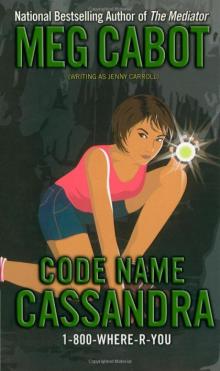 Code Name Cassandra
Code Name Cassandra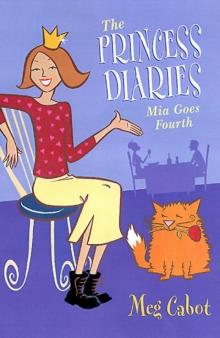 Mia Goes Fourth pd-4
Mia Goes Fourth pd-4 Sanctuary 1-4
Sanctuary 1-4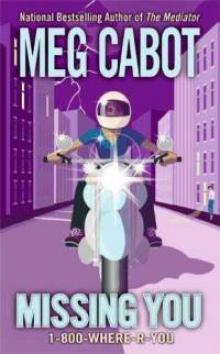 Missing You 1-5
Missing You 1-5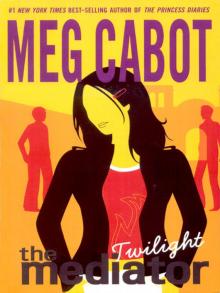 The Mediator 6: Twilight
The Mediator 6: Twilight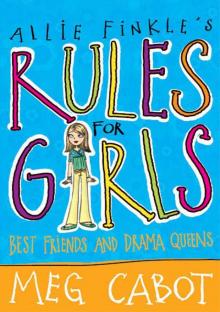 Allie Finkle's Rules for Girls: Best Friends and Drama Queens
Allie Finkle's Rules for Girls: Best Friends and Drama Queens The Boy Next Door
The Boy Next Door Every Boy's Got One
Every Boy's Got One Princess Mia pd-9
Princess Mia pd-9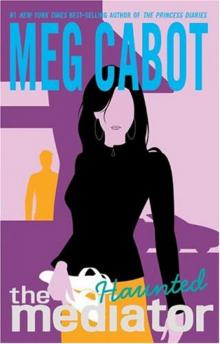 Haunted tm-5
Haunted tm-5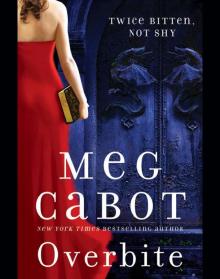 Overbite
Overbite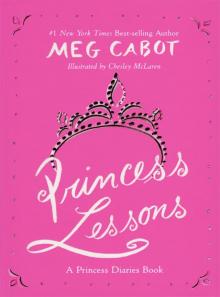 Princess Lessons
Princess Lessons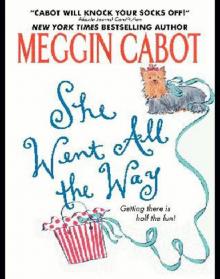 She Went All the Way
She Went All the Way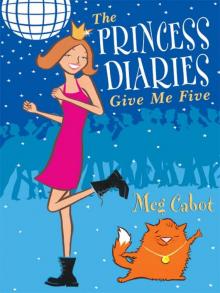 Give Me Five pd-5
Give Me Five pd-5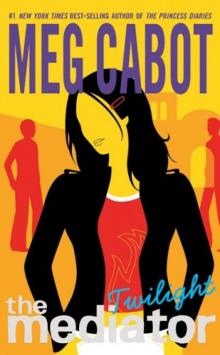 Twilight tm-6
Twilight tm-6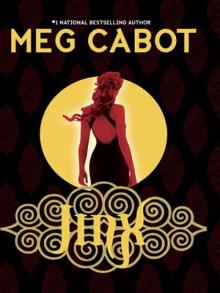 Jinx
Jinx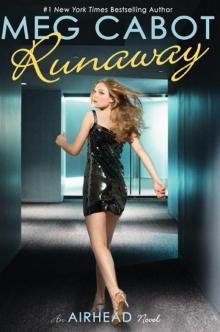 Runaway (Airhead #3)
Runaway (Airhead #3)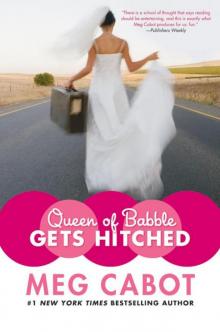 Queen of Babble Gets Hitched qob-3
Queen of Babble Gets Hitched qob-3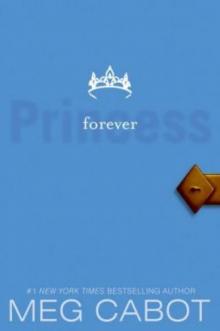 Forever Princess pd-10
Forever Princess pd-10 Queen of Babble
Queen of Babble Boy Meets Girl b-3
Boy Meets Girl b-3 Pants on Fire
Pants on Fire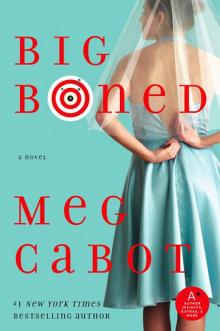 Big Boned ху-3
Big Boned ху-3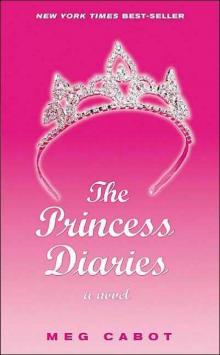 Princess' Diaries pd-1
Princess' Diaries pd-1 Size 14 Is Not Fat Either hwm-2
Size 14 Is Not Fat Either hwm-2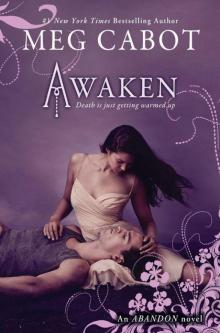 Awaken a-3
Awaken a-3 Queen Of Babble: In The Big City qob-2
Queen Of Babble: In The Big City qob-2 Nicola and the Viscount
Nicola and the Viscount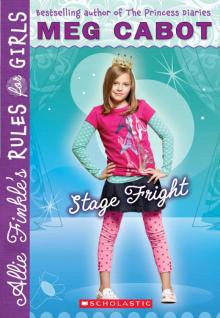 Allie Finkle's Rules for Girls: Stage Fright
Allie Finkle's Rules for Girls: Stage Fright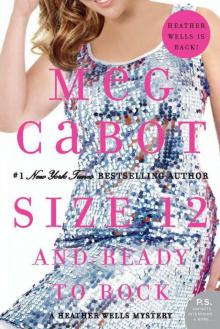 Size 12 and Ready to Rock
Size 12 and Ready to Rock Perfect Princess
Perfect Princess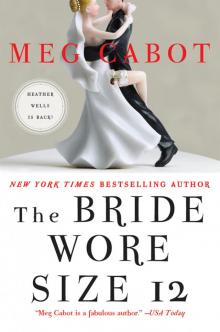 The Bride Wore Size 12
The Bride Wore Size 12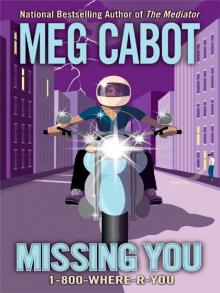 1-800-Where-R-You: Missing You
1-800-Where-R-You: Missing You How to Be Popular
How to Be Popular Queen of Babble Bundle with Bonus Material
Queen of Babble Bundle with Bonus Material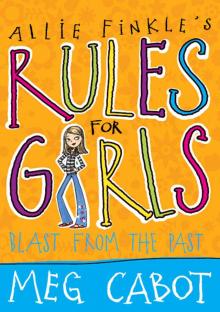 Allie Finkle's Rules for Girls: Blast from the Past
Allie Finkle's Rules for Girls: Blast from the Past Princess in the Spotlight pd-2
Princess in the Spotlight pd-2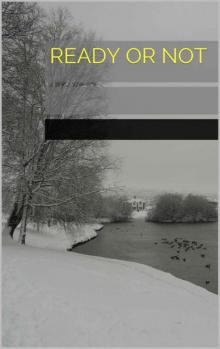 Ready or Not
Ready or Not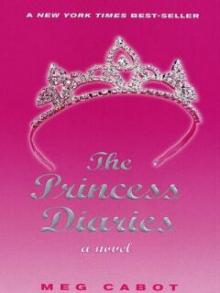 The Princess Diaries I
The Princess Diaries I Party Princess pd-7
Party Princess pd-7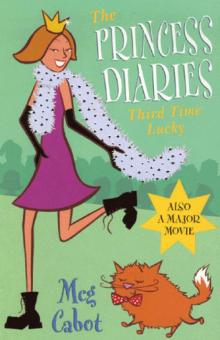 Third Time Lucky pd-3
Third Time Lucky pd-3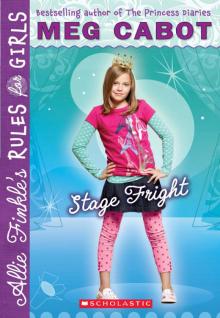 Stage Fright
Stage Fright From the Notebooks of a Middle School Princess
From the Notebooks of a Middle School Princess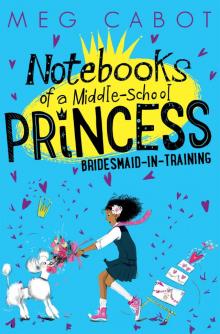 Notebooks of a Middle-School Princess Bridesmaid-in-Training
Notebooks of a Middle-School Princess Bridesmaid-in-Training Boy Meets Girl
Boy Meets Girl Missing You
Missing You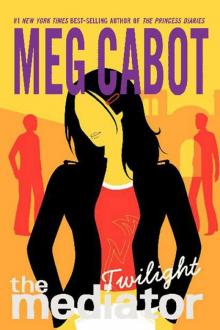 The Twilight
The Twilight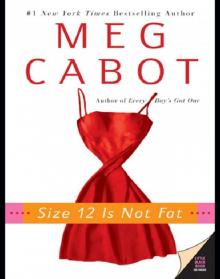 Size 12 Is Not Fat
Size 12 Is Not Fat Code Name Cassandra 1-2
Code Name Cassandra 1-2 Valentine Princess
Valentine Princess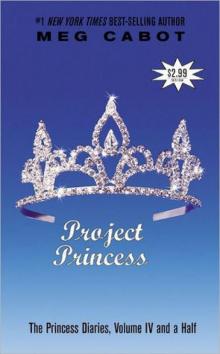 Project Princess
Project Princess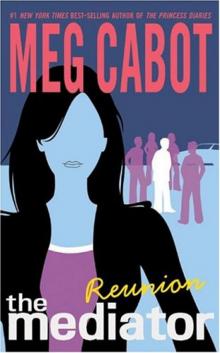 Reunion tm-3
Reunion tm-3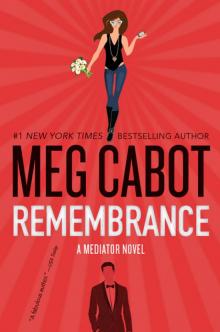 Remembrance: A Mediator Novel
Remembrance: A Mediator Novel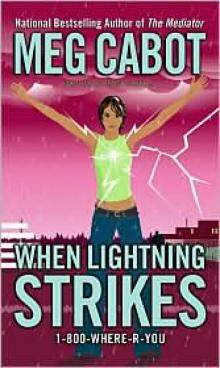 When Lightning Strikes 1-1
When Lightning Strikes 1-1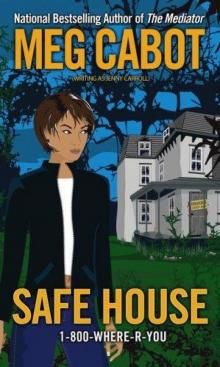 Safe House 1-3
Safe House 1-3 Teen Idol
Teen Idol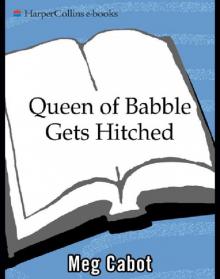 Queen of Babble Gets Hitched
Queen of Babble Gets Hitched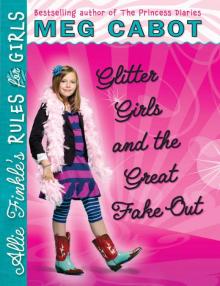 Glitter Girls and the Great Fake Out
Glitter Girls and the Great Fake Out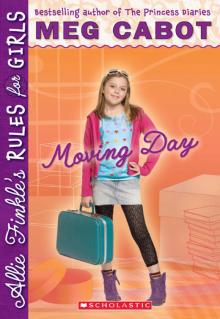 Moving Day
Moving Day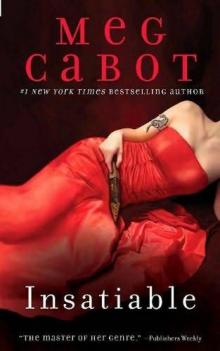 Insatiable
Insatiable All American Girl
All American Girl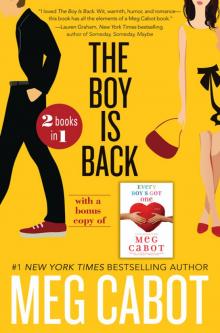 The Boy Is Back + Every Boy's Got One Bundle
The Boy Is Back + Every Boy's Got One Bundle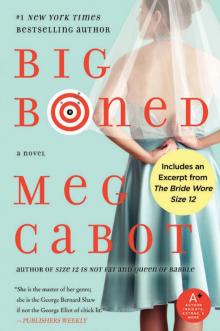 Big Boned
Big Boned Awaken
Awaken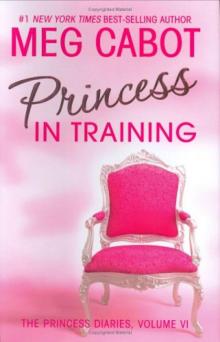 Princess in Training pd-6
Princess in Training pd-6